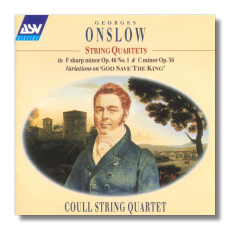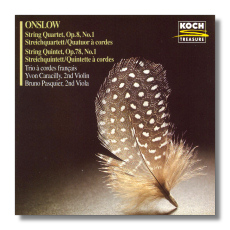
The Internet's Premier Classical Music Source
Related Links
- Latest Reviews
- More Reviews
-
By Composer
-
Collections
DVD & Blu-ray
Books
Concert Reviews
Articles/Interviews
Software
Audio
Search Amazon
Recommended Links
Site News
 CD Review
CD Review
Georges Onslow

String Quartets
- Variations on "God Save the King" from String Quartet in G minor, Op. 9/1 (1815)
- Quartet in F Sharp minor, Op. 46/1 (1839)
- Quartet in C minor, Op. 56 (1842)
Coull String Quartet
Academy Sound & Vision CDDCA808 69:44 DDD


- Quartet Op. 8/1 (1814)
- Quintet Op. 78/1 (1849)
Yvon Caracilly, violin
Bruno Pasquier, viola
Trio a Cordes Français
Koch Treasure 3-1623-2 46:13 ADD
Who was Georges Onslow? The question would have been redundant a century and a half ago, but the reputation he enjoyed during his lifetime swiftly followed his music into oblivion, leaving only his name on the lips of musicologists. So it is good to see him getting some recorded attention, for there is an enormous quantity of music waiting to be discovered. His surname suggests that he was an Englishman. Not so, but his father, Edward, an MP and son of the first Earl of Onslow, was, fleeing his native country for France after a homosexual scandal (Edith Cresson would not have been surprised, I suppose). After two years he married, and Georges, born into comfort and wealth at Clermont Ferrand, was his second son. Georges studied in London with Hüllmandel (another composer waiting to be discovered), Dussek and Cramer, and with Rejcha in Paris. His monied existence did away with the drudgery of earning a living, and Onslow used his leisure to produce an astonishing quantity of music. In an age of prolific composers, Onslow went beyond most of them: a total of four operas and as many symphonies may be modest, but there are also 34 string quintets and 36 string quartets and a corpus of other chamber works that includes six piano trios, quantities of cello sonatas, violin sonatas and four-hand piano sonatas. These works display a wonderful mastery of counterpoint, and if these two recordings betoken a more systematic examination of his copious output, we will be enriched indeed.
The Coull Quartet's CD of two of the String Quartets confirm that Onslow's mastery of counterpoint was completely natural, for the music flows with an ease that reminds one of the quartets of Haydn, an obvious model. But Onslow's music also has a sense of passion and drama that owes much to Beethoven. Its sense of order may be eighteenth-century but it has a rich harmonic palette that clearly looks forward to the nineteenth. Equally obviously, he shared a lively sense of humour with both older composers: it infects his finales in particular but also contributes in general to a rhythmic variety that keeps his textures alert and constantly interesting. The quartets the Coull have chosen for this recording are the works of a mature composer: the Haydn influence has been throughly absorbed. In the earlier quartet played by the Trio à Cordes Français with Yvon Caracilly (a first recording) Papa H is much more readily audible, even down to an important solo part for first violin in the slow movement; and, again like Haydn, the Trio of the Menuet has a lustily rustic character (It is headed "Air de danse des montagnes d'Auverge"). The French coupling, by contrast, is maturest Onslow: a richly scored Quintet (Onslow, as Mozart, added an extra viola), dark, passionate, convincing music that really ought to be much better known. It is a masterpiece.
The Coull playing suffers occasionally from rough intonation, particularly from the first fiddle, who sometimes plays with more passion than accuracy. And passion these performances certainly have, in contrast with the rather tidy (but accurate) playing of the Trio à Cordes Français team on Koch International. Their recorded sound, too, is rather boxy, revealing its fifteen-year-old vintage; the Coulls, by contrast, have a marvellously full-blooded tone. The Coulls also offer the early "Variations on 'God Save the King" (no amount of contrapuntal ingenuity can disguise the banality of that tune) from one of Onslow's Op. 9 series of quartets to make their CD much better value than the Koch release, which is over twenty minutes shorter. Still, I would not like to be without either disc. If you have to choose one, go for the Koch: that Quintet has to be heard.
Copyright © 1993, 1996, Martin Anderson


















